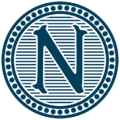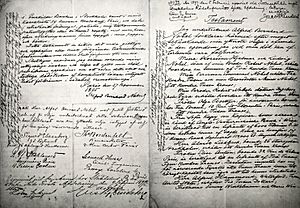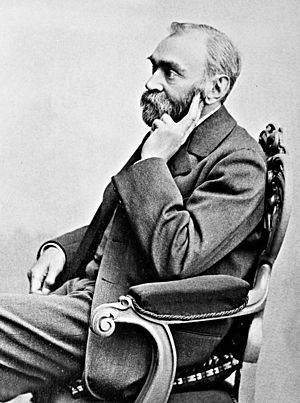Nobel Foundation facts for kids

The Nobel Foundation crest
|
|
| Formation | 29 June 1900 |
|---|---|
| Headquarters | Stockholm, Sweden |
The Nobel Foundation is a special organization created on June 29, 1900. Its main job is to manage the money and rules for the famous Nobel Prizes. This foundation was set up because of the last wishes of Alfred Nobel. He was the person who invented dynamite. The Foundation also organizes special meetings called Nobel Symposia. These meetings discuss new discoveries in science and important topics for society.
Contents
The Story of Alfred Nobel and His Prizes
Alfred Nobel was born in Stockholm, Sweden, on October 21, 1833. He was a brilliant chemist, engineer, and inventor. He is most famous for inventing dynamite. Alfred Nobel also owned a large company called Bofors. This company made weapons.
Nobel had 355 different patents, which are special rights for inventions. Dynamite was his most well-known invention. Thanks to his inventions, Alfred Nobel became very wealthy during his lifetime. He passed away in 1896 in Italy.
Alfred Nobel's Will
Before he died, Alfred Nobel wrote a will. A will is a legal document that says what should happen to a person's money and belongings after they pass away. In his will, Nobel made a surprising request. He wanted most of his money to be used for prizes. These prizes would be given to people who had done great things for humanity.
He wanted five different prizes:
- One for discoveries in physics.
- One for important chemical discoveries.
- One for discoveries in physiology or medicine.
- One for outstanding works of literature.
- One for efforts towards peace among nations.
Nobel wrote his last will in November 1895. He left about 94% of all his money to create these five Nobel Prizes. This was a huge amount of money. In today's money, it would be hundreds of millions of US dollars.

Alfred Nobel wanted the prizes to go to the most deserving people. He said that a person's nationality should not matter. The best person should receive the prize, no matter where they were from.
Creating the Nobel Foundation
After Alfred Nobel passed away, two people, Ragnar Sohlman and Rudolf Lilljequist, were in charge of his will. They created the Nobel Foundation. This foundation was set up to manage Nobel's money and organize the prizes.
It took five years to get everything ready. There were some challenges because Nobel's plan was new and different. Finally, the Nobel Foundation was officially established on June 29, 1900. The very first Nobel Prizes were awarded on December 10, 1901. One of the first winners was Wilhelm Röntgen.
As of December 31, 2020, the Nobel Foundation had a lot of money. It was about 5.2 billion Swedish kronor. This is roughly 630 million US dollars.
What the Nobel Foundation Does
The Nobel Foundation is a private organization. Its main job is to manage the money Alfred Nobel left behind. This money is kept in a special fund. The Foundation invests this money carefully. This helps make sure there is always enough money for the prizes and for running the organization.
The Nobel Foundation also represents the Nobel Prize to the world. It handles many activities and issues related to the prizes. However, it is important to know that the Nobel Foundation does not choose the Nobel Prize winners. Different groups of experts choose the winners for each prize.
The Foundation does not have to pay taxes in Sweden (since 1946) or in the United States (since 1953). This helps them keep more money for the prizes. In the early 1980s, the prize money was 1 million Swedish kronor. By 2008, it had grown to 10 million Swedish kronor.
The Foundation has a Board of five people. This Board makes important decisions. The prize-awarding groups also have trustees and auditors who help oversee the Foundation's work.
Nobel Symposia: Sharing New Ideas
In 1965, the Nobel Foundation started a program called Nobel Symposia. These are special meetings where experts discuss important topics. They focus on areas of science where big discoveries are happening. They also talk about other important cultural or social issues.
Some topics discussed at these symposia have included diabetes mellitus, string theory, and even the Cold War. These meetings help share new ideas and knowledge around the world.
Other Prizes and the Nobel Name
In 2007, some members of the Nobel family announced a plan for a new prize. It was called the Michael Nobel Energy Award. This award would honor new ideas in clean energy. It would be the first new Nobel prize started by the Nobel family since Alfred Nobel created his original prizes.
However, the Nobel Foundation quickly reacted to this. They said that using the "Nobel" name for a new prize could be confusing. They wanted to protect the good name and reputation of the original Nobel Prizes. The director of the Nobel Foundation and the head of the Nobel family did not approve of this new award.
See also
 In Spanish: Fundación Nobel para niños
In Spanish: Fundación Nobel para niños
- Lars Ernster (1920–1998) – a professor of biochemistry and a former member of the Board of the Nobel Foundation
- Ragnar Sohlman
- List of wealthiest charitable foundations
- Nobel Conference
- Wolf Foundation
 | Selma Burke |
 | Pauline Powell Burns |
 | Frederick J. Brown |
 | Robert Blackburn |


